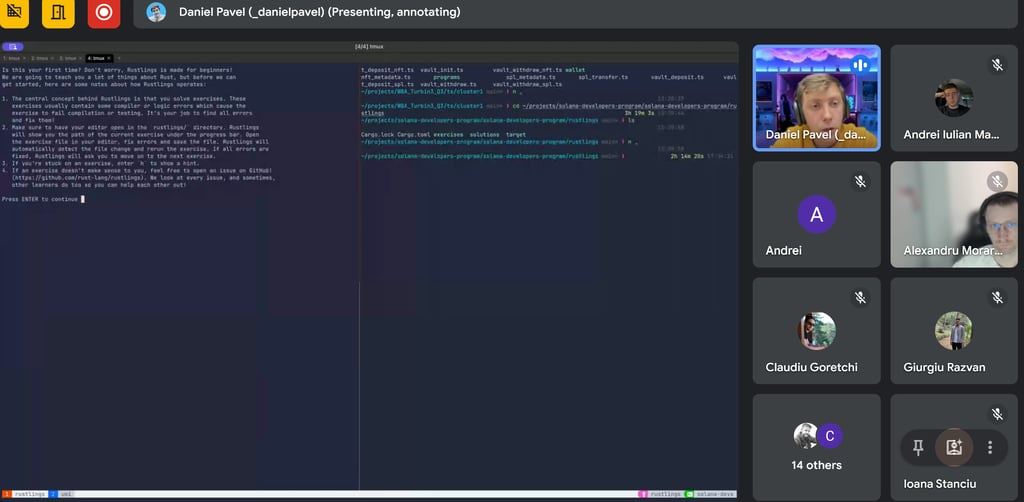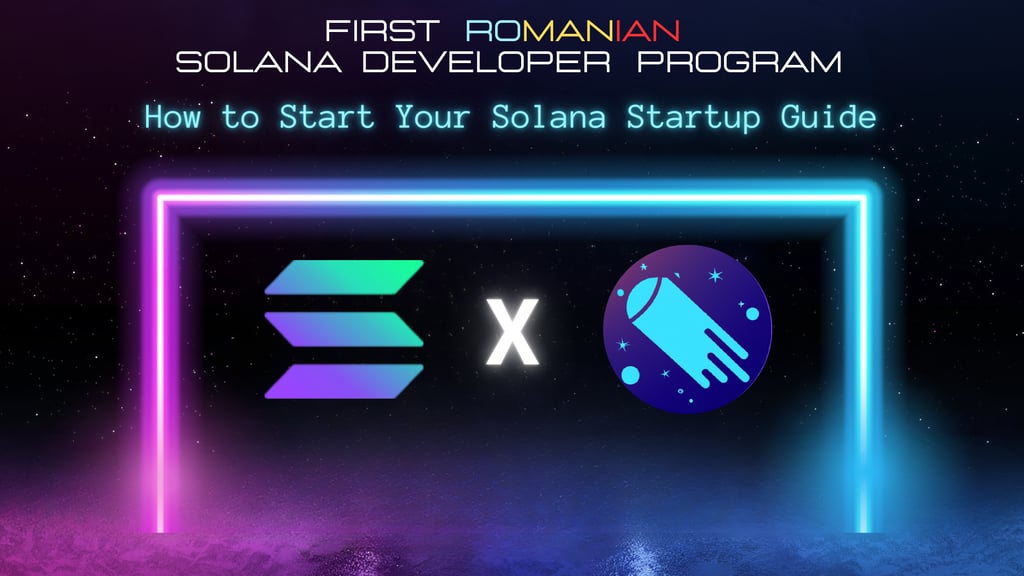How to Start Your Solana Startup Guide
Ioana Stanciu
1/20/20254 min read
This Q&A was inspired by the First Romanian Solana Developer Program, 2nd Cohort, which recently concluded its final session. During the meetup, participants gained actionable advice from guest speakers Marius Ciubotariu from Kamino Finance, one of the most renown Romanian Solana projects and Brianna Migliaccio Dev Rel from the Solana Foundation, both experienced builders in the Web3 space. The discussion emphasized strategies for building, marketing, and scaling startups in dynamic environments like Solana Ecosystem.
Below is a synthesis of their shared insights and practical advice, tailored to aspiring entrepreneurs.
Q&A: Launching Your Startup – A Beginner’s Guide
Q: What’s the first step to starting a startup?
A: Define a specific problem to solve. It can stem from personal experience, market inefficiencies, or user pain points shared on platforms like Twitter. Validate the idea through research or small prototypes.
Q: How critical is participating in hackathons?
A: Hackathons, like those hosted by Solana, are a gateway to visibility, networking, and funding. Submitting a project gets you noticed by users, investors, and the developer community, as Marius explained during his testimonial.
“Participating in the Solana Hackathon gave us a much-needed boost. We gained exposure to investors and users almost instantly.” – Marius Ciubotariu Co-Founder Kamino Finance
Q: What books can help me get started?
A: Essential reads for startup founders include:
Q: What are the benefits of having a cofounder?
A: A cofounder brings complementary skills and shared accountability. Avoid having too many cofounders to prevent decision paralysis, and ensure compatibility to reduce conflicts. As Marius shared, emotional and strategic support from a cofounder is invaluable.
Q: When should I build an MVP, and what should it include?
A: Build your MVP early, focusing on one key feature that demonstrates your product’s value. Marius emphasized:
“If your app provides one action that delivers value, strip away everything else and ship it.”
Q: What’s the best way to market my startup?
A: Engage with your audience where they already are. For Web3, platforms like Twitter are ideal. Share progress, build in public, and learn the basics of guerrilla marketing. Brianna highlighted that community participation is vital to gaining traction.
Q: How do I hire and build a development team?
A: Look for passionate developers who demonstrate productivity and have side projects or open-source contributions. Leverage networks, recruiters, and Solana’s job board. Offering clear goals and meaningful projects can also attract talent.
“Good developers love to code. Look for people who are proactive and willing to learn.” – Marius Ciubotariu Co-Founder Kamino Finance
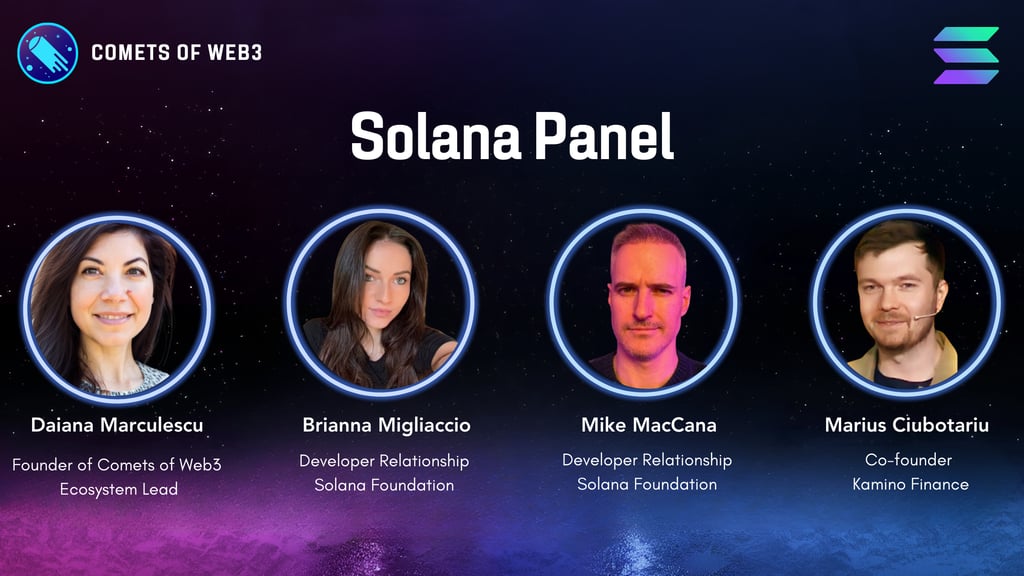

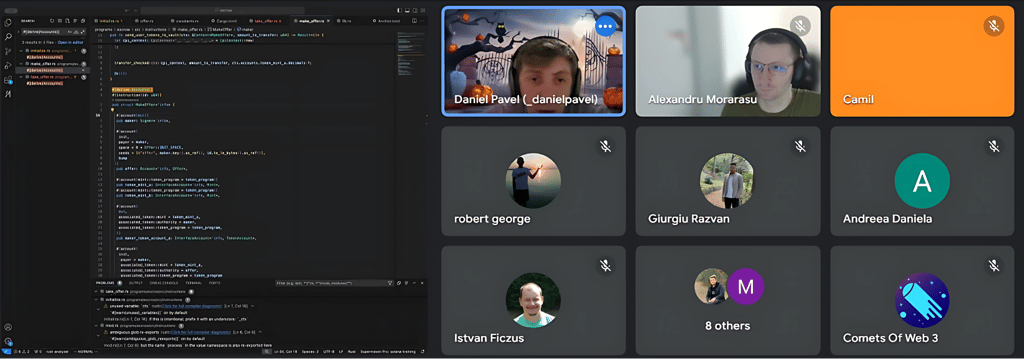

Q: What’s a good way to learn Solana development?
A: Build small projects to practice. Examples include a coin-flip app or a simple prediction market. Start with Solana’s GitHub program examples and follow the bootcamp structure.
“The best way to learn is by doing—pick a small project and work through it.” – Brianna Migliaccio Dev Rel Solana Foundation
Q: How can I contribute to the Solana ecosystem?
A: Join Solana’s open-source community by working on popular GitHub repositories. Projects like Solana Starter App are excellent starting points. You can also contribute to major projects or improve tools like wallets.
“Contributing to GitHub repositories is a great way to get noticed by the community.” – Marius Ciubotariu Co-Founder Kamino Finance
Q: What differentiates Solana from other blockchains?
A: Solana’s scalability and low transaction costs make it ideal for user-facing applications. Its robust developer ecosystem offers a collaborative environment that accelerates innovation.
“If you give users a choice between slow and expensive versus fast and cheap, they’ll choose the latter.” – Marius Ciubotariu Co-Founder Kamino Finance
Q: What are some advanced projects to build after mastering the basics?
A: Solana’s ecosystem offers templates for advanced projects like lending protocols, stablecoins, and lottery systems. Use oracles like Pyth or Switchboard to integrate real-time data.
Q: How do I fundraise effectively?
A: Build an MVP and create a pitch deck outlining your vision, product, and monetization strategy. Apply to accelerators like:
“With a good MVP and deck, even pre-product startups can secure funding.” – Marius Ciubotariu Co-Founder Kamino Finance
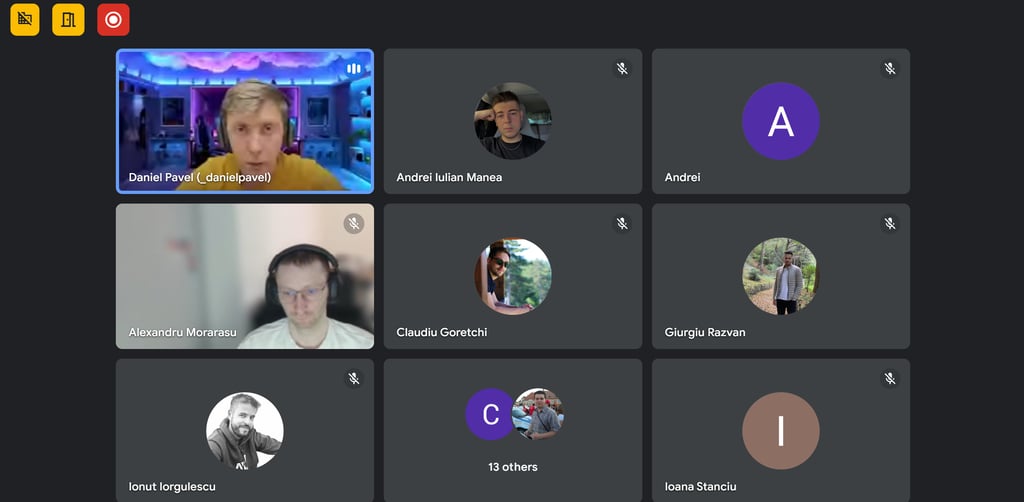

Q: What are the best resources for developers?
A: Explore these to sharpen your skills:
Q: When do I pivot or quit?
A: Continuously evaluate user engagement and market fit. If feedback is consistently negative or market conditions render the product unviable, consider pivoting. Marius shared that even seasoned founders face this challenge but emphasized persistence.
Q: What are some exciting areas to innovate in?
A: Ideas shared during the meetup include:
Consumer-centric Web3 apps (e.g., decentralized Uber-like services).
Improving existing products with enhanced efficiency or user experience.
Developing templates for blockchain links to facilitate on-chain transactions.
Brianna added:
“Think of Web2 apps that can benefit from a Web3 backend. These ideas have immense potential.”
Resources for Aspiring Founders
Books: Zero to One by Peter Thiel, The Hard Thing About Hard Things by Ben Horowitz.
Programs: Solana Bootcamp, Colosseum Accelerator, or hackathons.
Repositories: Explore Solana Developer Resources and contribute to open-source projects.
